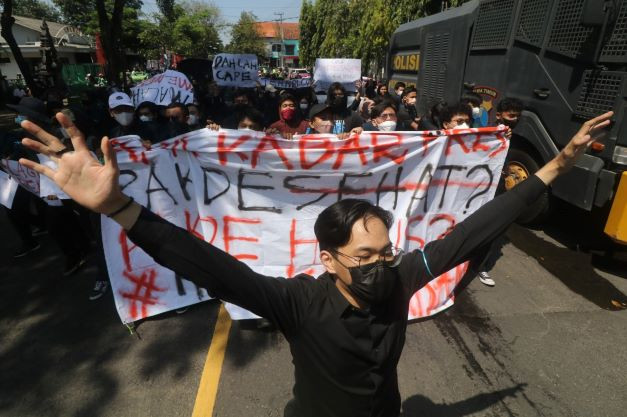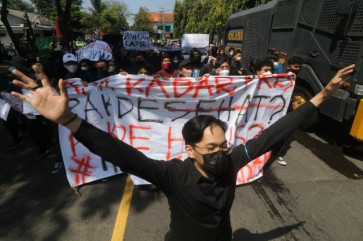Popular Reads
Top Results
Can't find what you're looking for?
View all search resultsPopular Reads
Top Results
Can't find what you're looking for?
View all search resultsIndonesian netizens: The uncivil society?
In contrast, with the help of social media, it is easier today for these uncivil societies to gather support.
Change text size
Gift Premium Articles
to Anyone
 Rallying cry: Members of the Islamic Student Association (HMI) rally outside the Regional Legislative Council in Kediri, East Java, on Monday. Students in a number of cities around the country protest both the increasing prices of fuel and cooking oil and the talk of plans to extend the presidential term. (Antara/Prasetia Fauzani)
Rallying cry: Members of the Islamic Student Association (HMI) rally outside the Regional Legislative Council in Kediri, East Java, on Monday. Students in a number of cities around the country protest both the increasing prices of fuel and cooking oil and the talk of plans to extend the presidential term. (Antara/Prasetia Fauzani)
R
emember when a retired mentalist broadcast a podcast with a gay couple? Almost the whole nation was against it and felt obliged to give out statements. They ranged from a simple netizen to the deputy chairman of the Indonesian Ulema Council (MUI) and even the coordinating political, legal and security affairs minister.
For a nation often said to be one of the friendliest in the world, it is fascinating how easily Indonesian netizens can be triggered. And they will not hesitate to try to gather support from more people -- turning what is basically a rant into a big movement. They will not stop until they get what they demand either.
Online, this might seem harmless, as within hours or days, our feeds and timelines will refresh and give us other content to fight over. Yet, could this mentality be our democracy’s Achilles’ heel? And why does it seem like, over the years, it has been very uncontrollable?
We often see civil society as a balancing force to the state and the market in a democratic society. This applies as well in Indonesia. The civil society often challenges the state’s pro-market/pro-investment policies like the Job Creation Law. Regardless of their success, they are at least able to provide a tiny counterweight to put a bit more balance on the scale.
However, as the late Parahyangan University professor Bob Hadiwinata said, in a country in which liberalism is not the tradition of the people, civil society is not only those that support democracy. Civil society groups in these countries can also be associated with their primordial bond, exclusive, closed to plurality and often, trying to create their own hegemony. These are the groups Bob considered uncivil society, and therefore the impedance to our democracy.
Before the digital age, even though these groups were dangerous, we knew that their proportion was small compared to the general population. Compared to today, it was also harder for these groups to collect support.
In contrast, with the help of social media, it is easier today for these uncivil societies to gather support. Retweets, likes and shares now can be seen as a justification of their ideas, given the agreements from others. They also seem to appear as a bigger group: The digital sphere is vast, yet you feel as if they saturate it.


















